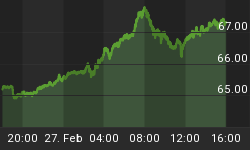Barely two years ago, the gig economy was a volatile mess as investors and regulatory authorities scrambled to determine whether people who worked for ride-hailing companies such as Uber Technologies (NYSE:UBER) and Lyft Inc. (NASDAQ:LYFT) were employees who deserved the usual employee benefits such as an hourly minimum wage, overtime, and paid sick days or were merely contractors. Fast forward to the present and investors are more worried about a much more existential crisis: skyrocketing fuel prices.
As the Russia-Ukraine war enters the fourth week, oil and commodity markets have recorded massive gains thanks to shuttering of Ukrainian ports, sanctions against Russia and disruption in Libyan oil production and crop and metal buyers scrambling for replacement supplies. Russia is one of the world's biggest exporters of key raw materials, from crude oil and gas to wheat and aluminum, and the possible exclusion of supplies from the country due to sanctions has sent the markets into a frenzy.
With fuel prices hitting all-time highs, the two leading ride-sharing companies have decided to add a "temporary fuel surcharge" to fares across the country. The fees will go directly to drivers and couriers, who are responsible for paying for the gas they use. The new pricing is set to begin Wednesday, though Uber says it will "continue to monitor gas prices and may make additional changes."
"Rides customers will pay a surcharge of either $0.45 or $0.55 on each Uber trip, and Eats customers will pay either $0.35 or $0.45 on each Uber Eats order, depending on their location," Uber has said in a blog post.
The ride-hailing giant has been quick to highlight the benefits of switching to an electric vehicle. Drivers who drive BEVs receive extra incentives, such as $1 more per trip up to $4,000 annually through Uber's Green Future Program. Moreover, U.S. drivers are eligible to receive $6,000 off the Nissan LEAF, discounted pricing for other EVs, as well as incentives related to home charging installation.
The national average for a gallon of gas currently stands at $4.32 per gallon, according to data from AAA, about 52% higher than a year ago. In California, the largest market for gig work in the U.S., the price of gas is now a staggering $5.74 per gallon on average.
As expected, Lyft has quickly followed Uber’s lead and is set to add a fuel surcharge to its ride amid rising gas prices, the company has told The Verge.
A Lyft spokesman has told the news outlet the company has been "closely monitoring" rising gas prices and while driver earnings are higher than they were last year, it will ask riders to pay a "temporary fuel surcharge" which the drivers will receive entirely.
Lyft a Buy
Uber shares rose on Friday after Deutsche Bank started coverage on the mobility company, noting it has several positives going for it, including the ability to "unlock large and growing [total addressable markets]."
Analyst Benjamin Black started coverage on the stock with a buy rating and a $50 price target, implying some 60% upside, writing that it has "global market leadership" in areas that are growing; a number of "durable and defensible core growth drivers," as well as low investor sentiment.
"Uber's current businesses address a roughly $7 trillion market (of which a subset is serviceable), and our bullish view on the stock is grounded in its powerful platform synergies, which should drive faster and more efficient penetration of the [total addressable market] versus its competitors," Black wrote in a note to clients.
Still, UBER has lost nearly a third of its value after it issued a 2024 profit guidance below Wall Street’s expectations.
Wall Street seems to think more highly of Uber’s key rival.
On average, Wall Street experts rate Lyft as a Buy, though skepticism remains about the company's near-term ability to push higher in the face of uncertain economic times.
Of the 40 analysts who follow the stock, 17 rate Lyft a Strong Buy and eight a Buy while another 13 give the stock a Hold. One analyst rates Lyft a Sell and another one grants it a Strong Sell opinion.
Looking at specific analyst commentary, Truist Securities gives an upbeat response to the firm's earnings report, although it lowered its price target, given the recent share decline. LYFT stock is down nearly 20% in the year-to-date.
“We remain constructive on LYFT as positive Q4 2021 and Q1 2022 guide show that it continues to deal with an uneven recovering in rideshare, yet manages to deliver on expectations,” wrote Truist Securities analysts following the earnings report.
“Lyft remains positioned to emerge financially learner with richer products and a strong momentum to ride growth in the $1T Transportation-as-a-Service total addressable market,” the analysts added. Truist maintained their buy rating on the stock but dropped their price target to $58 from $80.
Citi Research analysts also rated the stock a Buy, but likewise lowered their price target to $78 from $95.
“Although we expect 2022 to prove challenging amid the current crisis, we maintain a positive long-term view of fundamentals,” wrote Citi analysts in a note released on Feb. 8.
















